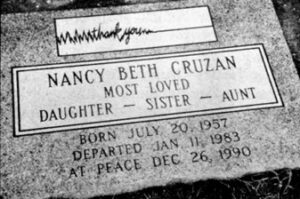“Thank You” . . . Ongoing Bioethics Legacy of the Cruzan Case
By Tarris (Terry) Rosell, DMin, PhD, HEC-C
Rosemary Flanigan Chair in Bioethics
Like many aspiring or actual boomer retirees with a love of nature and a penchant for camping, I hope over the next decade or so to visit all or most of the U.S. national parks. Ruth and I have our Lifetime Senior passes and we’ve checked off nearly a dozen parks already visited on the map that hangs on a bedroom wall.
 But one additional pilgrimage on my retirement travel bucket list is closer to home than any of those national parks. Just down the road a couple hours from Kansas City is Carterville, Missouri. And in a rural cemetery there will be found the iconic tombstone of a young woman whose death—or deaths, as her family’s pro bono attorney would write many years later—was a touchstone for the nascent bioethics movement. Nancy Beth Cruzan’s case was also a catalyst for the growth of Midwest Bioethics Center, now the Center for Practical Bioethics.
But one additional pilgrimage on my retirement travel bucket list is closer to home than any of those national parks. Just down the road a couple hours from Kansas City is Carterville, Missouri. And in a rural cemetery there will be found the iconic tombstone of a young woman whose death—or deaths, as her family’s pro bono attorney would write many years later—was a touchstone for the nascent bioethics movement. Nancy Beth Cruzan’s case was also a catalyst for the growth of Midwest Bioethics Center, now the Center for Practical Bioethics.
Accident and Aftermath
I want to visit and see in person on that grave marker in Carterville two words especially that have helped define my life and bioethics vocation. Those words are, “Thank You.”
The Cruzan family, in a dispute with their daughter’s care providers and state politicians, was represented all the way to the U.S. Supreme Court by Kansas City attorney William Colby. Bill later came to work with us for a short time at the Center. He did so after the publication of his excellent memoir titled, Long Goodbye: The Deaths of Nancy Cruzan (ISBN-13: 978-1401901325, Hay House, Inc., 2003).
Nancy had a car wreck in 1983 and suffered anoxic brain injury, leaving her in a permanent vegetative state (PVS). After several years of treatment, hopes and prayers, her loving Catholic family decided Nancy would not want to go on existing in PVS. She had sleep/wake cycles, yes, but with severe muscle contractures and without awareness or any reasonable hope of ever recovering consciousness. It was like their daughter had died already, way back in that farmer’s field where Nancy had been ejected from her vehicle face down in the mud, unconscious and unable to breathe. EMTs would arrive later and restart her heart, but too late to save brain cells required for regaining consciousness.
Ethical or Homicidal
Eventually, Nancy’s parents asked caregivers to stop medically assisted nutrition and hydration (MANH)—the “feeding tube.” To some people, that seemed homicidal, and to others ethically and legally permissible. Their case went through all levels of the judicial system until finally the Cruzans were allowed to have MANH stopped. And the day after Christmas, December 26, 1990, with protesters outside the Missouri Rehabilitation Center and a grieving family at bedside, Nancy took a last breath yet again and her heart went silent.
By this time, the Cruzan case was international news. It had been many years in the making and many of us followed each court ruling with great interest. For the Cruzan family, it was brutal. Nancy’s father ultimately would take his own life. American society was divided between those of us who believed in the right for family surrogates to stop MANH in a case of PVS and others well-intended like my “right to life” parents who believed a disabled adult was being murdered down in southwest Missouri.
Epitaph of Gratitude
A political cartoonist, obviously more aligned with “right to die” advocates, depicted the ending of Nancy’s life as a heart monitor slowing to flatline with two words spelled out in the ECG waves: “thank you.” Her parents had it engraved on their daughter’s tombstone.
I have taught, written or referred to the Cruzan case hundreds of times in the past 30 years. I became acquainted with members of the Cruzan family and worked as a colleague with their attorney. I gave lectures in a medical school down in Joplin, bypassing many times the Carterville Cemetery where Nancy’s body is interred.
One of these days, in semi-retirement from bioethics vocation, I intend to stop and search for that tombstone. I will read the words at the top and say them aloud in a fitting response to those numerous people, including the Cruzans, who have impacted significantly my life and vocation. To my own family, teachers, students, employers, colleagues, patients, benefactors, and readers, also: Thank You.


